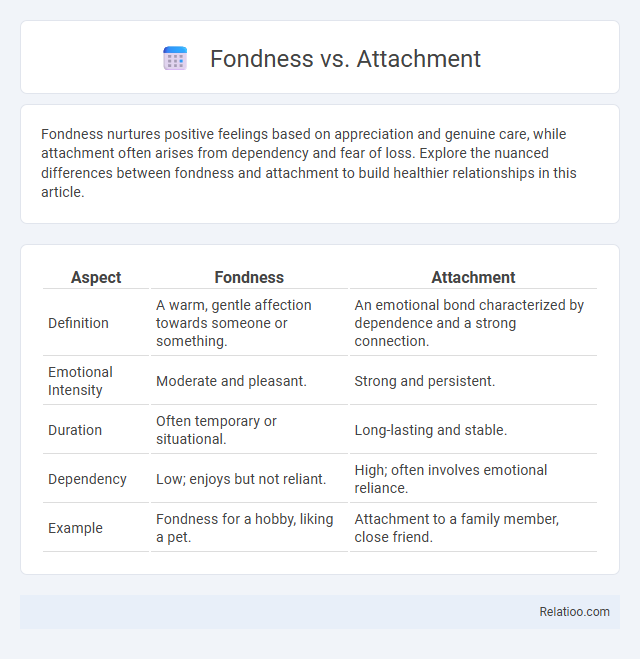Fondness nurtures positive feelings based on appreciation and genuine care, while attachment often arises from dependency and fear of loss. Explore the nuanced differences between fondness and attachment to build healthier relationships in this article.
Table of Comparison
| Aspect | Fondness | Attachment |
|---|---|---|
| Definition | A warm, gentle affection towards someone or something. | An emotional bond characterized by dependence and a strong connection. |
| Emotional Intensity | Moderate and pleasant. | Strong and persistent. |
| Duration | Often temporary or situational. | Long-lasting and stable. |
| Dependency | Low; enjoys but not reliant. | High; often involves emotional reliance. |
| Example | Fondness for a hobby, liking a pet. | Attachment to a family member, close friend. |
Understanding Fondness: Definition and Key Traits
Fondness is characterized by a gentle affection and positive feelings toward someone or something, often marked by warmth and appreciation without intense emotional dependency. Unlike attachment, which implies a deeper emotional bond and reliance, fondness remains a lighter, more flexible sentiment that fosters goodwill without binding obligations. Understanding your fondness helps clarify the nuances of your emotional landscape, enabling healthier relationships and balanced emotional investments.
What is Attachment? Core Concepts Explained
Attachment is a deep emotional bond formed between individuals, often characterized by a desire for closeness and security. Core concepts include the attachment styles--secure, anxious, avoidant, and disorganized--which describe patterns of behavior and emotional responses in relationships. Attachment theory highlights how early interactions with caregivers influence adult relational dynamics and emotional regulation.
Emotional Depth: How Fondness and Attachment Differ
Fondness reflects a lighter, more casual emotional connection, often characterized by warmth and appreciation without a strong need for closeness, while attachment conveys a deeper, more intense bond that involves dependency and a desire for security. Your feelings of fondness may foster pleasant interactions, but attachment typically influences your emotional stability and responsiveness to the relationship's dynamics. Understanding these differences helps clarify how emotions vary in depth and impact within personal connections.
Biological Roots: The Science Behind Fondness and Attachment
Fondness and attachment both have biological roots involving neurotransmitters such as dopamine, oxytocin, and serotonin, which regulate feelings of pleasure, bonding, and emotional connection. Attachment is primarily linked to oxytocin release during close physical and emotional interactions, fostering long-term bonding essential for survival and social cohesion. Fondness, while also influenced by these chemicals, often reflects a more immediate and less intense emotional appreciation shaped by dopamine-driven reward pathways.
Psychological Perspectives on Fondness vs Attachment
Psychological perspectives distinguish fondness as a positive emotional appreciation marked by warmth and affection, whereas attachment is characterized by a deep emotional bond driven by the need for security and dependence. Fondness tends to be more flexible and less intense, facilitating positive social interactions without the compulsion seen in attachment dynamics. Attachment theories highlight the role of early caregiver relationships in forming secure or insecure bonds, influencing emotional regulation and interpersonal behaviors throughout life.
Manifestations in Relationships: Signs of Each
Manifestations of fondness in relationships include frequent warm gestures, gentle compliments, and a genuine interest in the partner's well-being, signaling positive emotional regard without dependency. Attachment is characterized by a strong emotional bond, evidenced by seeking closeness, feeling anxious when apart, and prioritizing the partner's approval and presence for emotional security. Distinguishing attachment from fondness involves recognizing attachment's intensity and potential clinginess, whereas fondness reflects a lighter, affectionate connection with respect for autonomy.
Fondness and Attachment: Impact on Personal Well-being
Fondness and attachment both influence your emotional well-being but differ in their psychological impacts; fondness promotes positive feelings and healthy emotional connections without dependence, while attachment can lead to emotional vulnerability if overly strong or insecure. Understanding the balance between fondness's warm, flexible appreciation and attachment's deeper emotional investment helps maintain mental stability and resilience. Prioritizing fondness over attachment supports a healthier mindset and fosters personal growth and emotional independence.
Navigating Boundaries: Healthy vs Unhealthy Attachment
Understanding the differences between fondness and attachment is crucial for navigating boundaries in relationships, as fondness reflects genuine appreciation, while attachment can range from healthy emotional connection to unhealthy dependency. Healthy attachment supports mutual respect, trust, and individuality, fostering emotional security without over-dependence, whereas unhealthy attachment may lead to possessiveness or loss of personal boundaries. Your ability to distinguish these dynamics ensures that relationships remain balanced, promoting well-being and emotional growth.
Fondness or Attachment: Which Drives Lasting Connections?
Fondness and attachment both play crucial roles in forming lasting relationships, yet attachment often signifies a deeper emotional bond rooted in security and trust. Fondness reflects positive feelings and affection that can spark connection, but attachment provides stability and commitment essential for long-term bonds. Understanding how attachment promotes resilience in relationships offers insight into sustaining enduring connections beyond initial fondness.
Cultivating Healthy Emotional Bonds: Practical Tips
Cultivating healthy emotional bonds requires understanding the differences between fondness, attachment, and deep affection. You can nurture fondness by expressing genuine appreciation and engaging in shared positive experiences, while maintaining boundaries to prevent unhealthy attachment. Prioritizing open communication and emotional awareness helps develop lasting, balanced connections that foster mutual respect and support.

Infographic: Fondness vs Attachment
 relatioo.com
relatioo.com